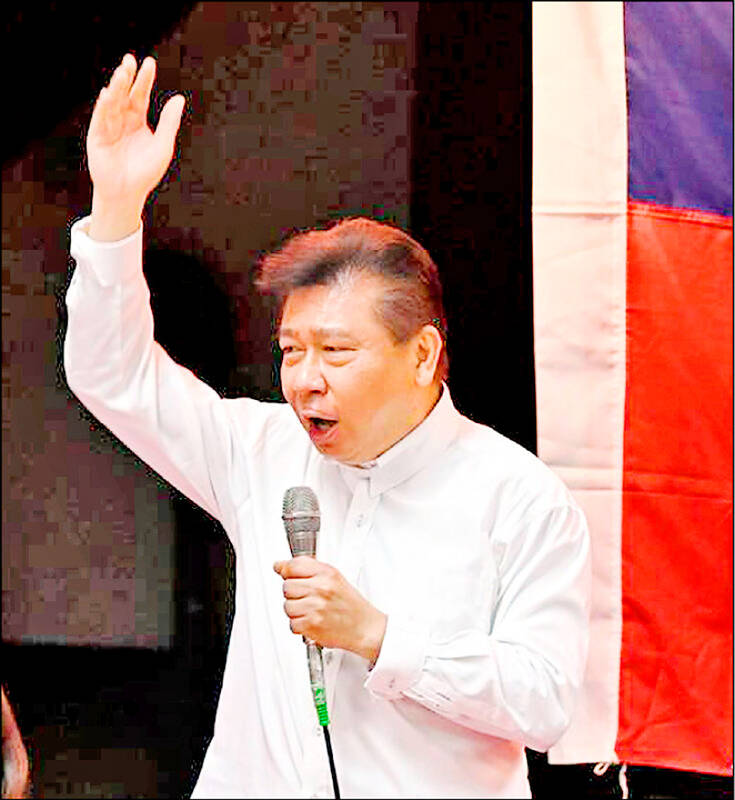Prosecutors formally indicted Chinese Nationalist Party (KMT) politician and former Mainland Affairs Council (MAC) deputy minister Chang Hsien-yao (張顯耀) on charges relating to interfering in Taiwan’s presidential election and allegedly taking instruction from the Chinese government.
After a more than one-year investigation, the Kaohsiung Ciaotou District Prosecutors’ Office pressed charges against Chang for allegedly contravening the Anti-Infiltration Act (反滲透法) and the Presidential and Vice Presidential Election and Recall Act (總統副總統選舉罷免法), a statement said on Wednesday.
As a former KMT legislator and current deputy director of the KMT’s Central Policy Committee, Chang had made several trips to China in 2023.

Photo: Tsai Ching-hua, Taipei Times
The indictment said that Beijing officials passed on instructions for Chang to push for a joint run by Terry Gou (郭台銘), founder of Hon Hai Precision Industry Co (鴻海精密), also known as Foxconn Technology Group (富士康科技集團), and former Taipei mayor Ko Wen-je (柯文哲) for president, the statement said.
During a visit to China on Sept. 11, 2023, Chang met with China’s Taiwan Affairs Office (TAO) Director Song Tao (宋濤) and Wang Huning (王滬寧), now Chinese People’s Political Consultative Conference chairman, deputy chief prosecutor Yen Yu-shan (顏郁山) said.
After the meeting, Chang informed Lee Wen-chung (李文宗), a close aide of Ko, that Beijing supported Ko running in the presidential election scheduled for January last year, and was in favor of a joint Ko-Gou ticket together, Yen said.
Chang agreed to cooperate and meet with Ko and Gou to ask them to form a joint third-party presidential ticket, with Ko as the vice presidential candidate, the indictment said.
“It came at a time when Chang was aware that the KMT had already formally nominated New Taipei City Mayor Hou You-yi (侯友宜) as its presidential candidate on May 17, 2023,” Yen said.
Chang said that the “situation with the KMT is more complicated, and there is very little likelihood of forming a Ko-Hou ticket” and “there are party figures already making moves to pressure Hou to drop out of the presidential race,” the indictment said.
Chinese officials had promised to help fund a Gou-Ko campaign by providing more than NT$100 million (US$3.05 million), Yen said, citing communication records of Chang’s.
Under instruction from Chinese officials, Chang agreed to organize media events and disseminate polls to promote the Gou-Ko ticket, Yen said, adding that on Aug. 4, 2023, Chang convened a forum with a news conference on the theme of “Taiwan presidential election, on interaction and impact on China-US relations.”
After the conference, Chang released a public opinion poll showing that President William Lai (賴清德), the Democratic Progressive Party candidate, led with 35.64 percent support, just ahead of 34.8 percent for a potential Gou-Ko ticket, with Hou far behind on just 17.4 percent.
Chang told the media that the key to winning the presidential election is to forge a Gou-Ko ticket, as it had the best chance of defeating Lai, the indictment said.
During the campaign, the Chinese government interfered in and manipulated Taiwan’s presidential election through Chang’s actions, in which Chinese officials passed instructions to Chang via intermediaries, the indictment said.

DAREDEVIL: Honnold said it had always been a dream of his to climb Taipei 101, while a Netflix producer said the skyscraper was ‘a real icon of this country’ US climber Alex Honnold yesterday took on Taiwan’s tallest building, becoming the first person to scale Taipei 101 without a rope, harness or safety net. Hundreds of spectators gathered at the base of the 101-story skyscraper to watch Honnold, 40, embark on his daredevil feat, which was also broadcast live on Netflix. Dressed in a red T-shirt and yellow custom-made climbing shoes, Honnold swiftly moved up the southeast face of the glass and steel building. At one point, he stepped onto a platform midway up to wave down at fans and onlookers who were taking photos. People watching from inside

A Vietnamese migrant worker yesterday won NT$12 million (US$379,627) on a Lunar New Year scratch card in Kaohsiung as part of Taiwan Lottery Co’s (台灣彩券) “NT$12 Million Grand Fortune” (1200萬大吉利) game. The man was the first top-prize winner of the new game launched on Jan. 6 to mark the Lunar New Year. Three Vietnamese migrant workers visited a Taiwan Lottery shop on Xinyue Street in Kaohsiung’s Gangshan District (崗山), a store representative said. The player bought multiple tickets and, after winning nothing, held the final lottery ticket in one hand and rubbed the store’s statue of the Maitreya Buddha’s belly with the other,

‘COMMITTED TO DETERRENCE’: Washington would stand by its allies, but it can only help as much as countries help themselves, Raymond Greene said The US is committed to deterrence in the first island chain, but it should not bear the burden alone, as “freedom is not free,” American Institute in Taiwan Director Raymond Greene said in a speech at the Institute for National Defense and Security Research’s “Strengthening Resilience: Defense as the Engine of Development” seminar in Taipei yesterday. In the speech, titled “Investing Together and a Secure and Prosperous Future,” Greene highlighted the contributions of US President Donald Trump’s administration to Taiwan’s defense efforts, including the establishment of supply chains for drones and autonomous systems, offers of security assistance and the expansion of

STREAMLINED: The dedicated funding would allow the US to transfer equipment to Taiwan when needed and order upgraded replacements for stockpiles, a source said The US House of Representatives on Thursday passed a defense appropriations bill totaling US$838.7 billion, of which US$1 billion is to be allocated to reinforcing security cooperation with Taiwan and US$150 million to replace defense articles provided to the nation. These are part of the Consolidated Appropriation Act, which the US House yesterday passed with 341 votes in favor and 88 against. The act must be passed by the US Senate before Friday next week to avoid another government shutdown. The US House Committee on Appropriations on Monday unveiled the act, saying that it allocates US$1 billion for the Taiwan Security Cooperation Initiative